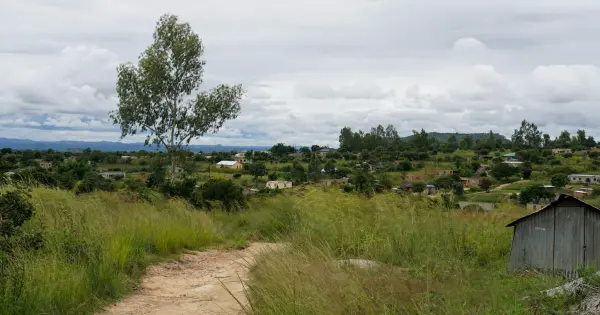In the diverse rental landscape of Zimbabwe, Harare stands out as the country's premier garden city - a metropolis where greenery flourishes alongside urban development. This guide is specifically designed for first-time renters, existing tenants wanting to understand their rights, and landlords seeking to effectively manage properties in Harare's garden-rich environment.
Simply put, renting in Harare combines modern, cosmopolitan living and natural beauty that's increasingly rare in today's world.
The rental market in Harare has evolved significantly in 2025, with property values stabilizing after the currency fluctuations that characterized previous years. As Zimbabwe's property market continues to mature, understanding the specific dynamics of garden city living becomes increasingly important for making informed rental decisions.
As Zimbabwe's leading real estate platform with over 8,000 listed properties and partnerships with more than 130 real estate agencies, Propertybook has observed distinctive patterns in Harare's garden city rental landscape that we'll share throughout this guide.
What Makes Garden City Living Different
Renting in a garden city like Harare differs markedly from other urban environments. The city features a predominance of houses with garden spaces rather than apartments, with most rental properties falling in the $150,000 to $250,000 price range for purchase value.
Our database of rental listings indicates that most Harare properties are 3-4 bedroom configurations, with 3-bedroom homes typically renting for $650 to $1,200 per month and 4-bedroom properties commanding around $1,000 to $2,200 monthly.
Unlike densely packed urban areas where outdoor space comes at a premium, Harare's garden city design provides generous plots with mature trees and planting spaces. This green character creates unique considerations for both tenants and landlords that aren't factors in other settings.
Essential Steps in the Garden City Rental Process
Finding and securing the right rental property in Harare involves several crucial steps unique to garden city environments:
Property Search Strategies
Before viewing properties, determine your priorities regarding outdoor space. Harare offers diverse options, from compact gardens requiring minimal maintenance to expansive grounds that provide significant privacy and natural beauty.
Most Harare rentals feature private gardens and outdoor spaces, so consider how much maintenance you're willing to undertake. While some properties include garden maintenance in the rental agreement, others leave this responsibility to tenants.
Propertybook's database currently shows over 100 garden-style listings in Harare with prices for middle-income properties ranging from USD 650 to USD 2,200 monthly. Properties typically feature 2-3 bedrooms and secure settings with varying sizes of private garden spaces.
Viewing and Assessment
When viewing potential rentals in Harare's garden-rich suburbs, pay particular attention to:
- Garden condition and maintenance requirements (Is irrigation installed? Are there mature trees that require care?)
- Water supply consistency (essential for garden maintenance in certain neighbourhoods)
- Security features (garden city properties typically require perimeter security due to their larger plots)
- Outdoor living spaces (verandas, patios, gazebos that enhance the garden city lifestyle)
- Natural lighting and ventilation (particularly important in Harare's summer months)
Take photographs during your viewing (with permission) and make detailed notes about any existing damage or wear, both indoors and in the garden areas. This documentation will be invaluable when it's time to recover your security deposit.
Application and Documentation
To secure a rental in Harare, prepare the following:
- Valid identification
- Proof of income (typically 3 months of bank statements or pay stubs)
- Professional and personal references
- Security deposit (usually 1-2 months' rent)
- First month's rent
Landlords in Harare generally expect tenants to earn monthly income at least three times the rental amount, ensuring financial stability throughout the lease term.
Understanding Tenant Rights in Garden City Rentals
As a tenant in Harare, you have several important legal protections under Zimbabwean law that apply specifically to garden city properties:
Right to Habitable Premises
Your rental property must be safe, secure, and in good repair. For garden city properties specifically, this includes:
- Working outdoor water connections for garden maintenance
- Safe pathways and external lighting
- Maintained boundary walls or fences
- Tree maintenance to prevent hazards
- Functional drainage systems to prevent flooding during rainy seasons
If your Harare rental fails to meet these standards, you have the right to request repairs. Should the landlord fail to address genuine habitability issues, you may have grounds for legal action according to local housing regulations.
Privacy Rights
Landlords must provide reasonable notice (typically 24-48 hours) before entering your rental property except in genuine emergencies. This protection ensures your quiet enjoyment of both the indoor and outdoor spaces that define garden city living.
Security Deposit Protections
While Zimbabwe lacks specific legislation regarding security deposit handling, standard practice in Harare requires landlords to:
- Provide itemized deductions when returning less than the full deposit
- Return deposits within 30 days of lease termination
- Use deposits only for unpaid rent or property damage beyond normal wear and tear
Document the property's condition thoroughly at move-in, including garden areas, to protect your deposit when you eventually vacate.
Landlord Obligations in Garden City Properties
Property owners in Harare have specific responsibilities related to garden city characteristics:
Property Maintenance
Landlords must maintain the structural elements of the property, including:
- Roof and exterior walls
- Plumbing systems (including outdoor water connections)
- Electrical systems (including outdoor lighting)
- Boundary walls and security features
- Major garden elements (mature trees, built-in irrigation systems)
For garden city properties specifically, landlords often handle larger garden maintenance issues like tree removal or irrigation system repairs, while tenants typically manage routine lawn care and gardening.
Legal Compliance
Harare landlords must:
- Ensure properties meet local safety codes
- Register with relevant authorities if applicable
- Pay appropriate property taxes
- Secure necessary permits for any structural modifications
- Comply with water restriction regulations that may affect garden maintenance
Failure to meet these obligations can result in fines or legal action, potentially affecting tenants' living situations.
Creating Effective Lease Agreements for Garden Properties
A comprehensive lease agreement protects both parties and prevents misunderstandings. Key elements to include for Harare's garden properties:
Essential Components
- Complete names of all tenants and the landlord
- Property address and description (including garden areas)
- Lease term (start and end dates)
- Rental amount, payment schedule, and acceptable payment methods
- Security deposit amount and conditions for return
- Utilities responsibility (who pays for water, especially important for garden maintenance)
- Garden maintenance responsibilities (clearly defined)
- Pet policies (particularly important for properties with gardens)
- Subletting rules
- Early termination conditions
Garden City-Specific Considerations
Harare's garden properties often have unique features that should be addressed specifically in lease agreements:
- Detailed garden maintenance responsibilities (often shared, with tenants handling routine care and landlords managing major issues)
- Water usage policies (particularly important during water restriction periods)
- Generator or solar backup power systems (if available, who maintains them)
- Tree maintenance and liability
- Pest control responsibilities (more significant in garden properties)
Having these elements clearly defined prevents disputes during the tenancy.
Conducting Effective Property Inspections for Garden Homes
Thorough inspections before move-in and after move-out protect both parties' interests.
Pre-Occupancy Inspection
Before signing the lease, conduct a detailed inspection with the landlord or property manager present. In garden properties, pay special attention to:
- Garden condition (lawn, trees, plantings, irrigation systems)
- Outdoor structures (gazebos, patios, pool areas)
- Boundary walls and gates
- External lighting and security systems
- Drainage systems and potential water issues
Take date-stamped photographs and have both parties sign the inspection report. This documentation establishes the property's baseline condition.
Move-Out Inspection
When vacating, request a joint final inspection to:
- Compare current condition to the move-in report, including garden areas
- Identify legitimate damage versus normal wear and tear
- Assess garden condition against seasonal expectations
- Agree on reasonable deductions, if any
- Establish a timeline for deposit return
This final walk-through helps prevent disputes about security deposit deductions.
Resolving Rental Disputes in Harare
Despite best efforts, conflicts sometimes arise between tenants and landlords in garden city rentals. Here's how to handle them effectively:
Direct Communication
Before escalating, attempt to resolve issues through clear, documented communication. Many garden-related disputes result from misunderstandings about maintenance responsibilities.
When writing to your landlord about issues, maintain a professional tone, clearly state the problem, reference relevant lease sections, and propose reasonable solutions.
Mediation Services
If direct communication fails, consider third-party mediation. Several real estate agencies operating in Harare offer dispute resolution services that can help parties reach compromises without costly legal proceedings.
Legal Recourse
For serious unresolved issues, legal options include:
- Small claims court for monetary disputes
- Housing courts for habitability issues
- Legal aid services for tenants with limited resources
Before pursuing legal action, consult with a qualified attorney familiar with Zimbabwe's property laws to understand your options and likely outcomes.
Financial Planning for Garden City Rentals
Effective budgeting ensures a sustainable rental experience. Beyond the monthly rent, Harare garden property tenants should budget for:
Typical Costs
- Security deposit (typically 1-2 months' rent)
- Utilities (water, electricity, internet) - approximately $100-200 monthly
- Garden maintenance (if tenant responsibility) - $50-100 monthly
- Security services (often necessary for garden properties) - $50-150 monthly
- Renter's insurance - $30-50 monthly
According to Propertybook's analysis of the Harare market, total monthly housing costs typically run 30-40% above the base rental amount when all associated expenses are included, with garden maintenance being a significant factor unique to this property type.
Cost-Saving Strategies
To manage rental costs in Harare effectively:
- Consider properties with included garden maintenance
- Look for homes with water-efficient gardens and drought-resistant plants
- Explore properties with solar backup to reduce electricity costs
- Negotiate longer lease terms for possible rate reductions
- Share larger properties with housemates to distribute garden maintenance duties
Careful planning prevents financial strain throughout your tenancy.
Navigating Harare's Garden Neighbourhoods
Harare encompasses several distinct garden city suburbs with unique characteristics. Understanding these differences helps you target your rental search effectively.
The city offers convenient access to key amenities, including:
- Shopping malls and retail centers
- Medical facilities
- Community parks and recreation areas
- Educational institutions
- Diverse dining options
When considering a Harare rental, evaluate proximity to these facilities based on your lifestyle needs. Propertybook's neighbourhood guides provide detailed information about specific suburbs and their garden city characteristics to help narrow your search.
Expert Tips for Garden City Tenants
Based on Propertybook's 17+ years of Zimbabwe real estate experience, here are our top recommendations for renting in Harare's garden suburbs:
- Consider seasonal timing - rental availability in garden areas peaks during December-January and June-July transitional periods
- Negotiate garden maintenance inclusions - many landlords will include basic maintenance if requested during lease negotiations
- Verify water supply consistency - critical for garden upkeep in certain neighbourhoods
- Check backup power options - given Zimbabwe's occasional power fluctuations
- Assess garden maturity - established gardens require less investment but more maintenance than newly landscaped properties
These insights, drawn from our database of over 7,000 properties and connections with more than 2,000 registered agents, help ensure your garden city rental experience meets expectations.
Final Considerations
Renting in Harare's garden city environment offers a distinctive lifestyle combining urban convenience with natural beauty. By understanding the unique aspects of this market, tenants and landlords can create mutually beneficial arrangements.
For personalized assistance with garden city rentals in Harare, visit www.propertybook.co.zw to access our comprehensive database of available properties and connect with specialized agents familiar with these areas.
Before finalizing any rental agreement, we recommend reviewing our guide on New Conveyancing Fees for Zimbabweand our warning about Title Deed Fraudsters to protect your interests.
With proper preparation and knowledge, your garden city rental experience in Harare can provide the perfect blend of comfort, convenience, and natural beauty in Zimbabwe's evolving property market.
Data last updated: May 2025. Property availability and pricing subject to change. Contact a registered Propertybook agent for current market conditions.




